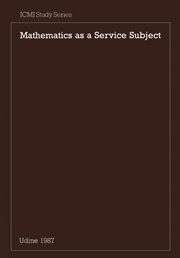Book contents
- Frontmatter
- Contents
- Foreword
- On the teaching of mathematics as a service subject
- What mathematics should be taught to students in physical sciences, engineering, …?
- Mathematics as a service subject – Why?
- Teaching first-year students
- Teaching mathematics to engineering students utilising innovative teaching methods
- Discrete mathematics: some personal thoughts
- Mathematical education for engineering students
- Some reflections about the teaching of mathematics in engineering schools
- Teaching mathematics as a service subject
- A Final Statement
- List of Participants
- Contents of Selected Papers on the Teaching of Mathematics as a Service Subject
Foreword
Published online by Cambridge University Press: 26 April 2011
- Frontmatter
- Contents
- Foreword
- On the teaching of mathematics as a service subject
- What mathematics should be taught to students in physical sciences, engineering, …?
- Mathematics as a service subject – Why?
- Teaching first-year students
- Teaching mathematics to engineering students utilising innovative teaching methods
- Discrete mathematics: some personal thoughts
- Mathematical education for engineering students
- Some reflections about the teaching of mathematics in engineering schools
- Teaching mathematics as a service subject
- A Final Statement
- List of Participants
- Contents of Selected Papers on the Teaching of Mathematics as a Service Subject
Summary
The present study, the third of the ICMI series, is the result of a cooperation between the Committee on the Teaching of Science of the International Council of Scientific Unions (ICSU–CTS) and the International Commission on Mathematical Instruction (ICMI). It is based on the work of a Symposium held in Udine (Italy), from 6 to 10 April, 1987, at the International Centre for Mechanical Sciences (Centre International des Sciences Mécaniques = CISM).
The study began by a careful investigation about the way mathematics is taught to students in another major subject in a few typical universities: Eindhoven Technical University in the Netherlands, Jadavpur University of Calcutta, India, Eötvös Lorand University and several other institutions in Budapest, Hungary, Florida Agricultural and Mechanical University in the USA, University College, Cardiff, U.K., University, of Southampton, U.K., Université de Paris–Sud à Orsay, France. The past and current presidents of ICSU–CTS (the physicist Charles Taylor and the biologist Peter Kelly) took part in the program committee, which included also the president and the secretary of ICMI, the mathematicians Tibor Nemetz and Fred Simons, the statistician Elisabeth de Turckheim, and the physicist Pierre Lauginie. The Program committee issued a discussion document, which was circulated to all national representatives of ICMI, and to various institutions. It was published in the journal L'Enseignement Mathématique, tome 31 (1986), pp. 159–172, and it also appeared in French, Italian and Spanish versions. Abstracts or quotations appeared in other scientific or vocational journals, it was discussed among members of several scientific institutions (including the Académie des Sciences de Paris) and among professionals, for example the Fondation Bernard Grégory.
- Type
- Chapter
- Information
- Mathematics as a Service Subject , pp. ivPublisher: Cambridge University PressPrint publication year: 1988
- 1
- Cited by

